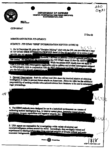Expurgation

Thomas Bowdler's famous reworked edition of William Shakespeare's plays. 1818
Expurgation is a form of censorship which involves purging anything deemed noxious or offensive, usually from an artistic work.
Bowdlerization is a pejorative term for the practice, particularly the expurgation of lewd material from books. The term derives from Thomas Bowdler's 1818 edition of William Shakespeare's plays, which he reworked in order to make them more suitable, in his opinion, for women and children.[1] He similarly edited Edward Gibbon's Decline and Fall of the Roman Empire.
A fig-leaf edition is such a bowdlerized text, deriving from the practice of covering the genitals of nudes in classical and Renaissance statues and paintings with fig leaves.
Examples
Religious
- In 1264, Clement IV ordered the Jews of Aragon to submit their books to Dominican censors for expurgation.[2]
Sexual
- "The Crabfish", (known also as "The Sea Crabb") an English folk song dating back to the mid-1800s about a man who places a crab into a chamber pot, unbeknownst to his wife, who later uses the pot without looking, and is attacked by the crab.[3] Over the years, sanitized versions of the song were released in which the lobster grabs the wife by the nose[4] instead of by the genitals[3] or that imply the location of the wounds by censoring the rhyming word in the second couplet. For instance, "Children, children, bring the looking glass / Come and see the crayfish that bit your mother's a-face" (ass).[5]
- The 1925 Harvard Press edition of Montaigne's essays (translated by George B. Ives) was published without the essays pertaining to sex.[6]
- A Boston-area ban on Upton Sinclair's novel Oil! – owing to a short motel sex scene – prompted the author to assemble a 150-copy fig-leaf edition with the nine offending pages blacked out as a publicity stunt.[7][8]
Racist
- Recent editions of many works—including Mark Twain's Huckleberry Finn[9] and Joseph Conrad's Nigger of the Narcissus—have found various replacements ("slave", "Indian", "soldier boy", "N-word", "children") for the word nigger. An example of Bowdlerization can be plainly seen in Huck Finn, in which Twain used racial slurs in natural speech to highlight what he saw as racism and prejudice endemic to the Antebellum South.
Cursing
- Many Internet message boards and forums use automatic wordfiltering to block offensive words and phrases from being published or automatically amend them to more innocuous substitutes such as asterisks or nonsense. This often catches innocent words also: see Scunthorpe problem.
Political
- Chinese internet filters – the Great Firewall – also work to block politically-sensitive terms and characters from being published on most public sites or loaded by domestic ISPs.
See also
References
- ↑ "Censorship" (PDF).
- ↑ Popper, William (1889). The Censorship of Hebrew Books. Knickerbocker Press. pp. 13–14.
- 1 2 Frederick J. Furnivall, ed. (1867). Bishop Percy's Folio Manuscript: loose and humorous songs. London. p. 100.
- ↑ "The Crabfish".
- ↑ "Crayfish".
- ↑ Bussacco, Michael C. (2009). Heritage Press Sandglass Companion Book: 1960–1983. Tribute Books (Archibald, Penn.). p. 252. Retrieved September 23, 2010.
- ↑ Curtis, Jack (February 17, 2008). "Blood from Oil". Boston Globe. Retrieved September 23, 2010.
- ↑ Sinclair, Mary Craig (1957). Southern Belle. New York: Crown Publishers. p. 309. Retrieved September 23, 2010.
- ↑ Tomasky, Michael (January 7, 2011). "The New Huck Finn". The Guardian. Retrieved September 6, 2013.
This article is issued from Wikipedia - version of the 11/7/2016. The text is available under the Creative Commons Attribution/Share Alike but additional terms may apply for the media files.
